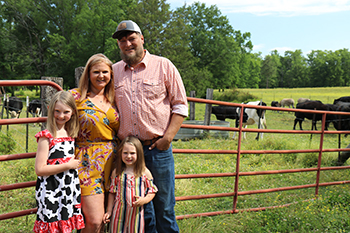Breaking Point: Mental Health Battle Real On Alabama Farms

Marlee Moore
(334) 613-4219
Stephen Newell is real about his struggle to find peace and mental wellness. The Calhoun County farmer said counseling sessions have helped him be a better person, husband to wife Ashley and father to Ashlyn and Tori.
While millions watched the 2018 Super Bowl from home, Stephen Newell was done playing games. The farmer, husband and father of two was checking himself into the hospital.
“I let my depression go too far,” he said. “I was too prideful to talk to someone. I don’t want to see anyone go through what I did.”
Escape felt impossible, Newell said. His beef cattle and hay operation weighed heavily on his mind — and, even at home, was present just outside his front door.
“I made a couple of business decisions that were questionable. I woke up one morning, and we’d lost thousands of dollars overnight,” said Newell, 34, who farms near the Calhoun and Talladega county lines. “I thought about harming myself. I thought, ‘Can I overcome this?’”
Newell buried the news for eight months from his wife, Ashley; father, Stephen; and grandmother, Vida. Around the same time, his father was diagnosed with cancer, and Vida had a debilitating car accident.
The pressure to provide was mounting, coupled with stressors Newell couldn’t control. Prices. Breakdowns. Weather.
“In today’s society, a man isn’t supposed to have issues,” Newell said. “I was angry inside, and Ashley didn’t know why. I was taking it out on them. I can’t lie. My wife and kids had to leave for me to realize I needed help.”
Countless farmers and rural residents fight the stigma that asking for help signals weakness, said Shanna McIntosh. She directs the Vital Project, a University of Alabama initiative to improve wellness in rural Alabama.
“Silence is deafening,” said Sumter County native McIntosh. “The more we keep silent and the less we talk to each other, the more alone we feel. This happens specifically with farmers because they have to be self-motivated, resourceful and independent.”
Farming is rewarding but inherently isolating, stressful and unpredictable, she said. That takes a toll.
The suicide rate among workers in farming, fishing and forestry industries is 1.5 times the national average at about 17 deaths per 100,000 workers, reports the Centers for Disease Control and Prevention.
Signs of stress can be physical, emotional, mental, behavioral and relational. Indicators include changes in routines or social activities, decline in care of livestock, increase in illness or chronic conditions, feelings of hopelessness, increase in farm accidents, decline in farmstead appearance, lack of concentration and more.
Rural areas often have limited health and mental health services, so knowing who can help when depression, anxiety and thoughts of self-harm manifest is challenging, McIntosh said.
Her recommendation: Contact a local physician, who can refer treatment.
The American Farm Bureau Federation (AFBF) has compiled farmer mental health resources through Farm State of Mind. AFBF, Farm Credit and the National Farmers Union launched Rural Resilience Training to recognize signs of farm stress, a program Alabama Farmers Federation field staff recently completed. Learn more at FarmStateOfMind.org.
Other assistance options include Farm Aid’s Farmer Resource Network at 1-800-FARM-AID; the National Suicide Prevention Hotline at 1-800-273-8255; or 211.org, which connects people to local resources.
The warning signs were there for Newell. Depression snowballed into anger issues. He stopped fishing and playing basketball. Smiling was a foreign concept.
“At first, Stephen tried to hide it because he didn’t want to seem like a failure,” Ashley said. “Depression is real and something more people need to discuss.”
One-on-one counseling opened the door for Newell to work through problems and find peace.
“Talking to someone is the best thing, as much as you may not want to,” he said. “I had to figure out who I was. I have to make myself happy before I can help anyone else.”
Newell prioritizes farm breaks, whether taking 8-year-old Ashlyn and 4-year-old Tori to barrel races or fishing on nearby Lake Logan Martin. And he’ll step back from frustrating situations such as equipment breakdowns.
He said mental wellness is a daily struggle and is comfortable calling his therapist when things get rough. He’ll check on friends regularly, too, because he knows the power of simply asking, “Are you OK?”
It’s an approach McIntosh applauds.
“If you see something, say something,” McIntosh said. “Let people know they are not alone.”
That realization led Newell to make his most challenging and worthwhile decision.
“Walking in a hospital was the hardest thing I’ve ever done,” Newell said. “It’s also the greatest thing I’ve ever done.”
